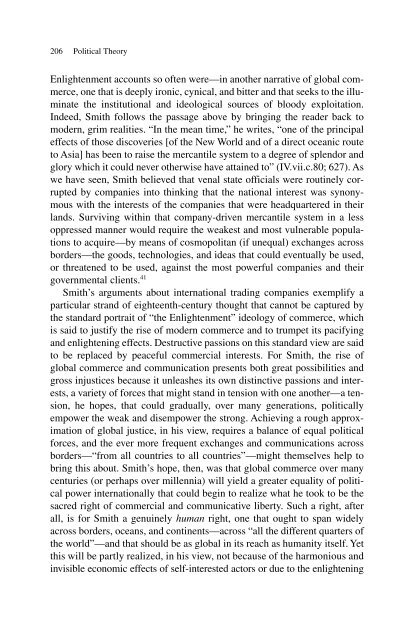Adam Smith's Critique of International Trading ... - Political Theory
Adam Smith's Critique of International Trading ... - Political Theory
Adam Smith's Critique of International Trading ... - Political Theory
You also want an ePaper? Increase the reach of your titles
YUMPU automatically turns print PDFs into web optimized ePapers that Google loves.
206 <strong>Political</strong> <strong>Theory</strong><br />
Enlightenment accounts so <strong>of</strong>ten were—in another narrative <strong>of</strong> global commerce,<br />
one that is deeply ironic, cynical, and bitter and that seeks to the illuminate<br />
the institutional and ideological sources <strong>of</strong> bloody exploitation.<br />
Indeed, Smith follows the passage above by bringing the reader back to<br />
modern, grim realities. “In the mean time,” he writes, “one <strong>of</strong> the principal<br />
effects <strong>of</strong> those discoveries [<strong>of</strong> the New World and <strong>of</strong> a direct oceanic route<br />
to Asia] has been to raise the mercantile system to a degree <strong>of</strong> splendor and<br />
glory which it could never otherwise have attained to” (IV.vii.c.80; 627). As<br />
we have seen, Smith believed that venal state <strong>of</strong>ficials were routinely corrupted<br />
by companies into thinking that the national interest was synonymous<br />
with the interests <strong>of</strong> the companies that were headquartered in their<br />
lands. Surviving within that company-driven mercantile system in a less<br />
oppressed manner would require the weakest and most vulnerable populations<br />
to acquire—by means <strong>of</strong> cosmopolitan (if unequal) exchanges across<br />
borders—the goods, technologies, and ideas that could eventually be used,<br />
or threatened to be used, against the most powerful companies and their<br />
governmental clients. 41<br />
Smith’s arguments about international trading companies exemplify a<br />
particular strand <strong>of</strong> eighteenth-century thought that cannot be captured by<br />
the standard portrait <strong>of</strong> “the Enlightenment” ideology <strong>of</strong> commerce, which<br />
is said to justify the rise <strong>of</strong> modern commerce and to trumpet its pacifying<br />
and enlightening effects. Destructive passions on this standard view are said<br />
to be replaced by peaceful commercial interests. For Smith, the rise <strong>of</strong><br />
global commerce and communication presents both great possibilities and<br />
gross injustices because it unleashes its own distinctive passions and interests,<br />
a variety <strong>of</strong> forces that might stand in tension with one another—a tension,<br />
he hopes, that could gradually, over many generations, politically<br />
empower the weak and disempower the strong. Achieving a rough approximation<br />
<strong>of</strong> global justice, in his view, requires a balance <strong>of</strong> equal political<br />
forces, and the ever more frequent exchanges and communications across<br />
borders—“from all countries to all countries”—might themselves help to<br />
bring this about. Smith’s hope, then, was that global commerce over many<br />
centuries (or perhaps over millennia) will yield a greater equality <strong>of</strong> political<br />
power internationally that could begin to realize what he took to be the<br />
sacred right <strong>of</strong> commercial and communicative liberty. Such a right, after<br />
all, is for Smith a genuinely human right, one that ought to span widely<br />
across borders, oceans, and continents—across “all the different quarters <strong>of</strong><br />
the world”—and that should be as global in its reach as humanity itself. Yet<br />
this will be partly realized, in his view, not because <strong>of</strong> the harmonious and<br />
invisible economic effects <strong>of</strong> self-interested actors or due to the enlightening
















